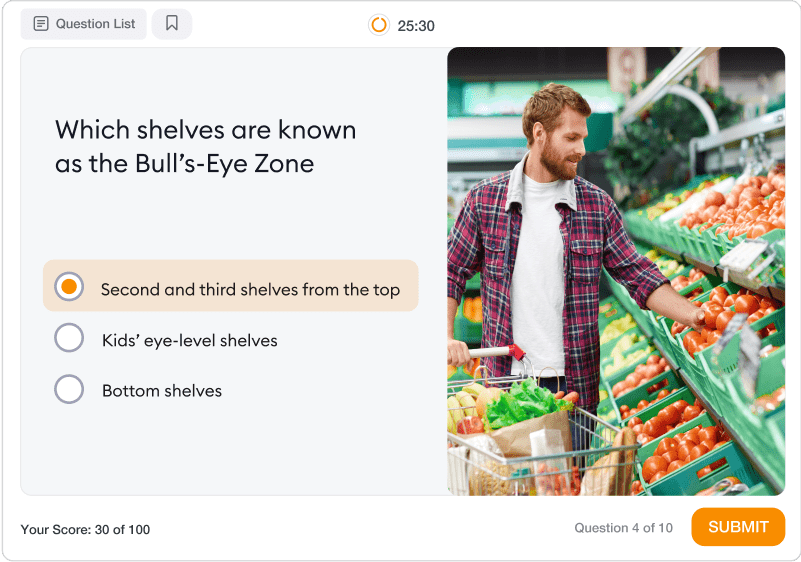Quiz vs. Test vs. Exam: Key Differences and When to Use Them

What’s the difference between a quiz, a test, and an exam? If you’re creating a course or planning a training session, understanding how each type of assessment works, as well as when to use it, is essential. Quizzes, tests, and exams differ in scope, timing, and purpose.
In this article, we’ll explain the key differences. You’ll also learn how to choose between a quiz and a test, when to use an exam instead, and how these different assessments can boost learning and improve educational outcomes.
TL;DR
The article explains the differences between quizzes, tests, and exams and when each should be used in learning. Quizzes are short, low-stakes checks of understanding focused on specific topics. Tests are longer, graded assessments covering broader material that measure retention and comprehension. Exams are the most formal and comprehensive, evaluating mastery across an entire course or program and often determining certification or pass/fail status. The piece also offers guidance on choosing and designing effective assessments and highlights tools for creating them, noting that the right format supports learning goals and provides useful insights into learner progress.
What’s the Difference Between a Quiz, a Test, and an Exam?
Choosing the right type of assessment isn’t just a matter of preference. It directly affects how learners absorb, retain, and apply knowledge. That’s why it’s important to understand the difference between a quiz, a test, and an exam.
Let’s break down each type and compare them.
What Is a Quiz?
A quiz is a brief, low-stakes assessment used to gauge the learner’s immediate understanding of a topic. Quizzes typically cover one concept, lesson, or module and are often ungraded or lightly weighted.
According to a 2025 study published in Nature, brief, low-stakes quizzes that focus on individual concepts or lessons can significantly reinforce learning and keep students engaged, supporting their use as a formative tool in education.
Unlike tests or exams, quizzes focus on short bursts of information and are ideal for quick knowledge checks. You might even encounter a quiz show format in training games or informal learning tools.
- Length: Short (5–10 questions)
- Format: Multiple-choice, true/false, short answer
- Purpose: Practice and self-check
- Common use: Mid-lesson checks, microlearning, compliance refreshers
What Is a Test?
A test is a structured assessment that measures how well learners understand a large body of material, usually a unit, module, or series of lessons. Unlike quizzes, tests are usually graded and contribute significantly to course completion or performance review.
A test often covers a large chunk of course material and may include standardized tests in academic settings. For example, a driving test evaluates both theoretical knowledge and real-life decision-making.
- Length: Medium (20–50 questions)
- Format: Mix of types, including open-ended or scenario-based questions
- Purpose: Evaluate retention and comprehension
- Common use: End-of-unit checks, onboarding training, tests, certification prep

What Is an Exam?
An exam is the most formal and comprehensive form of assessment. It measures how well learners have understood and retained what they’ve learned across an entire course or training program. Exams often determine whether a learner passes, qualifies, or earns certification.
Exams are comprehensive evaluations designed to assess a student’s ability to apply knowledge across an entire course or curriculum. They often require extensive preparation and may determine outcomes like qualification or certificate generation.
- Length: Long (60+ questions or multi-part)
- Format: Includes essays, case studies, and practical tasks
- Purpose: Final evaluation of course mastery
- Common use: Final exams, high-stakes assessments, professional certifications

Comparison Table: Quiz vs. Test vs. Exam
| Feature | Quiz | Test | Exam |
|---|---|---|---|
| Purpose | A quick assessment of understanding | Evaluate topic-level progress | Assess full-course mastery |
| Length | 5–10 questions | 20–50 questions | 60+ questions or multi-part tasks |
| Format | Simple (MCQs, T/F) | Mixed (MCQs, short answer, scenario) | Complex (case studies, essays, tasks) |
| Timing | During or after a lesson | At the end of a unit/module | At the end of a course or semester |
| Grading impact | Usually low or ungraded | Medium to high | High / pass-fail / certification |
| Formality | Informal | Semi-formal | Formal |
When to Use Each Assessment Type
Each type of assessment, whether a quiz, test, or exam, plays a role in the learning journey. Choosing the right one depends on your training goals, the complexity of the material, and how deeply you want to assess understanding at that point.
Let’s take a look at when each format works best.
When to Use a Quiz
Use quizzes when you want to:
- Reinforce new information immediately after it’s introduced.
- Boost engagement during a lesson or training session.
- Help students identify areas they struggle with early on.
- Prepare learners for higher-stakes assessments.
Examples:
- A short quiz after a compliance video to check retention
- A pop quiz at the start of a lesson to activate prior knowledge
- A multiple-choice check-in during microlearning modules

When to Use a Test
Use tests when you need to:
- Assess understanding of a complete topic, unit, or module.
- Track learning progress across a structured learning path.
- Provide measurable outcomes for trainers or stakeholders.
- Prepare students for standardized tests or certifications.
Examples:
- A test after a full sales training module to assess skill transfer
- A mid-course test to determine readiness to proceed
- A practice test simulating certification-style questions

When to Use an Exam
Use exams when the goal is to:
- Evaluate whether the learner has mastered the entire course material.
- Measure high-stakes outcomes like qualification or compliance.
- Issue certifications or track completion in formal programs.
- Validate readiness for role-specific tasks.
Examples:
- A final exam after an onboarding program
- A formal examination required for industry certification
- A multi-part exam combining quizzes, assignments, and simulations

How to Create Effective Assessments
After selecting the appropriate type of assessment, whether it’s a quiz, test, or exam, the next step is to create it. A well-designed assessment doesn’t just check what learners remember. It deepens their understanding, boosts retention, and helps you track progress at every stage.
Here’s how to create each type of assessment effectively.
How to Create Quizzes That Reinforce New Knowledge
To help students retain what they’ve just learned, it’s essential that you design quizzes that are timely, focused, and engaging.
Goal: Support retention and engagement right after content delivery.
Best practices:
- Use 5–10 focused questions per quiz
- Choose fast, lightweight formats: multiple-choice, true/false, short answer
- Deliver quizzes immediately after a lesson or module
- Provide instant feedback to strengthen recall
Here is an example of a quiz created with iSpring QuizMaker right in PowerPoint:

How to Build Tests That Measure Real Progress
To properly access understanding of a complete unit, tests must be thorough, objectively aligned, and diagnostic of learner progress.
Goal: Check comprehension of a full topic and identify areas for improvement.
Best practices:
- Combine simple questions with applied or scenario-based ones.
- Include short-answer, matching, and/or ranking formats to test understanding.
- Align test items directly with the related learning objectives.
- Provide clear scoring and meaningful feedback.
- Include problem solving and real-world use cases.
How to Design Exams That Validate Course Mastery
Exams that formally validate a learner’s mastery and synthesis of the entire course must be rigorous, secure, and conclusive.
Goal: Confirm whether learners have achieved the intended learning outcomes of an entire course.
Best practices:
- Structure exams as standalone modules within your LMS.
- Combine multiple-choice sections with case-based assignments or open questions.
- Define pass/fail rules, time limits, and scoring criteria in advance.
- Offer review checklists or pre-exam practice tasks.
- Use question types that test skills, synthesis, and the learner’s ability to apply the information to their work tasks.
Tools for Creating Quizzes, Tests, and Exams
Even the best-designed assessment strategy needs the right tools to bring it to life. Whether you’re building a quick quiz, a unit test, or a final exam, dedicated software helps you streamline the process, save time, and ensure consistent results across your learning program.
What to Look for in an Assessment Tool
When choosing a platform, consider whether it supports:
- A wide variety of question types
- Multimedia content and interactivity
- Flexible scoring, branching, and customization options
- Progress tracking and analytics
- Exam-level security (timers, randomization, IP control)
- Export options for SCORM/xAPI or direct LMS integration
Many platforms also offer automatic grading and certificate generation.
Top Tools for Creating Quizzes, Tests, and Exams
There are many tools that help you create digital assessments, from short knowledge checks to secure, high-stakes exams. Below is a comparison of some of the most widely used platforms by educators and training teams.
| Tool | Best For | SCORM Support | Key Strengths | Limitations |
|---|---|---|---|---|
| iSpring QuizMaker | All-purpose assessments (quiz, test, exam) |  | 14 question types, branching, scoring logic, LMS-ready solution) | Windows-only desktop app |
| ProProfs | Quick test creation |  | Templates, AI assistance, automation | Less control over scoring and customization |
| ClassMarker | Secure online exams |  | IP lock, private links, time limits | Most features require a paid plan |
| ExamSoft | High-stakes, proctored assessments |  | AI proctoring, offline mode, credentialing | Designed for institutions; steep learning curve |
| Kahoot! | Live, gamified quizzes |  | High engagement, real-time feedback | Not suitable for formal testing |
| Typeform | Conversational-style quizzes |  | Logic jumps, clean UI, integrations | Limited grading, no LMS support |
Each tool has its strengths. The best choice depends on your needs: brief quizzes, structured tests, or secure exams, as well as whether you need deep analytics or LMS compatibility.
If you’re looking for an all-in-one solution for building assessments at scale, iSpring QuizMaker offers the right balance of power, simplicity, and flexibility.

Key Takeaways
Quizzes, tests, and exams may seem similar, yet each plays a distinct role in the learning process.
- Use quizzes to reinforce understanding in the moment.
- Use tests to track progress across topics or modules.
- Use exams to validate complete mastery at the end of a course.
Choosing the right type of assessment at the right time not only improves learning outcomes but also gives you clearer insights into what’s working and where learners need support.
Whether you’re building a short course, a certification program, or company-wide training, having the right tools helps you do it faster, smarter, and with more confidence.
FAQ
How long should a quiz, test, or exam typically take?
Quizzes are typically brief, lasting 5-15 minutes. Tests take longer, often 30-60 minutes. Exams are the most comprehensive and can last anywhere from 1 to 3 hours or even more, depending on the subject and format.
How many questions do quizzes, tests, and exams usually have?
Quizzes typically have 5–15 questions. Tests usually contain 20–50 questions, while exams can range from 50 questions to several sections, covering an entire course or program.
When is it appropriate to use a quiz, a test, or an exam in a course or a corporate training program?
Use quizzes for quick checks of understanding after teaching a topic. Tests are best for assessing comprehension of a full unit or module. Exams are appropriate at the end of a course or training program to evaluate overall mastery.
How do quizzes, tests, and exams differ in terms of stakes and impact on grades (graded vs. ungraded assessments)?
Quizzes are often low-stakes or ungraded, encouraging practice and immediate feedback. Tests are moderate-stakes and typically contribute to overall grades. Exams are high-stakes, formal assessments that significantly affect final grades or certification outcomes.
What are common mistakes or misconceptions to avoid when using quizzes, tests, and exams?
Turning quizzes into mini-exams, relying only on final exams, making assessments too long or complex, and overlooking the value of frequent low-stakes checks.
Are standardized tests always multiple-choice, or can they include other formats?
They don’t have to be multiple-choice. While multiple-choice questions are common for their scalability and objective scoring, modern tests are increasingly diverse. Depending on your goals, they can also include short-answer questions, essays, case studies, simulations, and/or hands-on performance tasks to measure practical skills and deeper understanding.








